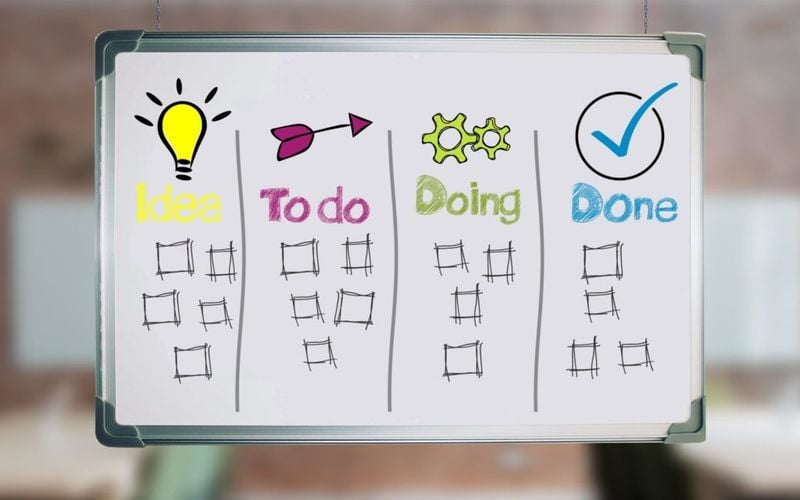Web Developer Career Guide
Before I go into detail about web development, I have to ask the question — why do you want to be a web developer? Close your eyes and imagine your career. What do you see?
- Do you envision designing a best-in-class website?
- Do you see yourself writing lines of code?
- Are you collaborating with customers and coworkers?

Knowing which part of web development appeals to you is the first step in mapping a web career because each area has different skill requirements.
What Are the Possible Career Paths?
What you enjoy most about web development should determine your career path. I know many web developers who started writing code only to realize they were drawn to design. Others I know jumped into the field without realizing there were different career paths and changed paths mid-stream. Here are the main areas of web development.
- Back-end. These developers work behind the scenes, making sure the website performs flawlessly. They determine a site’s framework and write code to make it work with front-end components. Their work may not be "seen," but it is experienced every time the site is visited.
- Front-end. These are designers as well as developers. They are responsible for the look and feel of a website. Front-end developers are focused on the customer journey, ensuring that the user design and experience attracts and retains visitors.
- Full-stack. If you’re interested in everything web, a full-stack developer may be the right fit. They have the skills for both back- and front-end development.
- Webmasters. These positions aren’t precisely development, but they are a career path. Webmasters are responsible for updating a website, testing new pages or code, and responding to end-user questions. In some instances, webmasters write code as part of maintaining a website.
No matter which path you choose, you’ll need to concentrate for long periods of time and be able to focus on details because small errors can have major impacts. Forget about the isolated programmer. Web developers need communication skills that let them collaborate with coworkers and customers.
What Do Web Developers Do?
In my experience, the larger the company, the more specialized the developer. Smaller businesses often require a more generalized web developer. That doesn’t mean you need to be a full-stack developer, but you may need to expand your skillset. Being a developer may involve any of the following:
- Integrating graphics, audio, video and text into a website.
- Defining site content
- Designing site layouts
- Writing and testing code
- Writing and testing web pages
- Collaborating with customers and coworkers
Because a web developer does so many things, it’s hard to list just a few. Just know that what you do often depends on the specific industry. For example, performance is essential for high-volume sites. E-commerce sites may require high-quality visualizations. Before deciding on a career path, look at the industries.
What Skills Do Developers Need?
Front-end developers need a different skillset from back-end programmers. A full-stack developer needs both skillsets, and a webmaster needs a strong skillset based on experience. Most webmasters start as a web developer before moving to a webmaster position.
Back-end Developer Skills
Back-end developers need at least one programming and one database language. Exposure to server architecture and API use is a plus.
- Programming Languages. You will need at least one server-side language such as PHP, Python, or C#.
- Database. The most common databases are Microsoft SQL Server, Oracle, or MySQL. Developers need to know how to use at least one of these database programming languages.
- Servers. Back-end developers need to know how to work with server and server tools such as Apache, Nginx, or IIS.
Front-end Developer Skills
Front-end developers who want to focus on design should consider courses in graphic design or data visualization in addition to the following:
- HTML. This programming language is essential for web-based applications. Without it, you can’t build a website.
- CSS. These are style sheets that make it possible to create web pages quickly and are used extensively by web developers.
- JavaScript. Front-end developers need a scripting language. JavaScript is the most used because it adds extensive functionality to web applications.
- Frameworks. Like CSS, frameworks provide a faster way to develop a web application. They provide a pre-existing structure for an entire website.
Full-stack developers need both front- and back-end skills. Webmasters need one set of developer skills plus experience in testing and managing websites.
Plenty of universities offer online web development programs. Some universities will offer an on-site program, as well. There are also individual courses and boot camps that offer recommended courses such as Introduction to JavaScript, Understanding Server Architecture or Managing a Relational Database. If you’re going to be a web developer, you need to become a life-long learner. Technology changes too rapidly to stop learning. I know many programmers who became unemployed because they failed to keep up with technology.
What is the Typical Salary for a Web Developer?.
The highest-paid web developers work in the non-internet publishing industries with an average salary of $73,760.00 in 2019. The lowest average salaries were around $68,000 for consulting and marketing firms. How much you make depends on experience and location. Take, for example, the salary for web developers in Seattle, Washington and Houston, Texas. Experienced web developers make about $154,000 per year in Seattle, but only $112,000 in Houston. Developers starting out can expect somewhere between $54,500 in Seattle to $49,000 in Houston. The U.S. Bureau of Labor Statistics projects the market for web developers to grow 13% between 2018 and 2028.
How to Find a Job?
Finding a job requires work. I know it’s time-consuming to customize your resume and cover letter for each position, but that’s what employers are looking for. From their perspective, a generic letter and resume communicate that you don’t care enough about the job to put in the effort to customize your resume and cover letter.
Resume
A resume should include the following information:
- Your contact information
- Summary of your career to date
- Bulleted list of skills
- Work Experience
- Education
- Projects
Your resume format is critical. Most job openings have hundreds of applicants, so the easier it is for the screeners to skim your resume, the better. Just make sure that the highlighted parts are the ones you want them to notice. When selecting a format, remember that many companies have programs that scan resumes looking for keywords. If the structure is hard to process, your information may never pass the scan. Read through the job description, noting what words are used to describe the position. Try to incorporate some keywords into your resume and cover letter.
Interview
If you’ve never had a phone or video conference interview, practice these methods as well as in-person interviews. You’ll be amazed at how many times you use filler noises such as hmmm when talking on the phone. You also need to get a feel for your tone and pitch over a cell phone or video conference. You don’t want your potential employer to keep asking you to repeat what you just said.
Here are a few interview questions to use as you practice.
- Describe a development project that you worked on.
- How do you react when a development project begins to veer off-course?
- Describe a development project that stumbled.
- What programming languages do you know?
- What programming languages are you in the process of learning?
- Why do you want to be a web developer?
- What is your favorite work environment?
- Do you enjoy collaborating with clients and coworkers?
- Do you prefer a boss or a mentor?
- How do you keep up with changes in technology?
Lastly, create a website, if you don’t have a sample project to show. Use the site as a way to showcase your skills.
Why Do You Want to be a Web Developer?
I asked that question at the start of this guide. Now that you’ve finished it, what is your answer? Are you ready to start a career in web development? With a projected 13% job growth over the next ten years, there’s no time like the present to start the move. I’d suggest making a list of the needed skills and then cross off those you already have. That way, you can focus on the skills you need and reach your goal faster.





